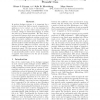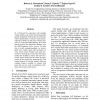10 search results - page 1 / 2 » Combining Acoustic and Pragmatic Features to Predict Recogni... |
ACL
2004
13 years 6 months ago
2004
We use machine learners trained on a combination of acoustic confidence and pragmatic plausibility features computed from dialogue context to predict the accuracy of incoming n-be...
ANLP
2000
13 years 6 months ago
2000
In spoken dialogue systems, it is important for a system to know how likely a speech recognition hypothesis is to be correct, so it can reprompt for fresh input, or, in cases wher...
NAACL
2010
13 years 2 months ago
2010
In a Wizard-of-Oz experiment with multiple wizard subjects, each wizard viewed automated speech recognition (ASR) results for utterances whose interpretation is critical to task s...
ACL
2001
13 years 6 months ago
2001
This paper focuses on the analysis and prediction of so-called aware sites, defined as turns where a user of a spoken dialogue system first becomes aware that the system has made ...
ICASSP
2008
IEEE
13 years 11 months ago
2008
IEEE
With the purpose of improving Spoken Language Understanding (SLU) performance, a combination of different acoustic speech recognition (ASR) systems is proposed. State a-posteriori...


